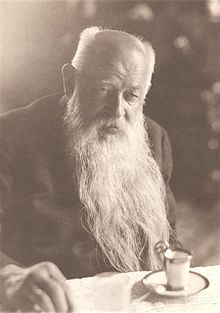Josef Holeček
Josef Holeček (born February 27, 1853 in Stožice near Vodňany, † March 6, 1929 ) was a Czech regional writer , representative of realism and country prose, translator and journalist .
After studying in Písek , České Budějovice and Tábor , he worked as an educator in Zagreb . In 1875 he wrote as a war correspondent for the Volksblatt ( Národní listy ). As an enthusiastic Slavist , he visited Russia , Asia Minor and Constantinople in the following years .
Works
He was a typical writer of rural literature. He described pictures of perfect villages where evil can be fought through love among people.
- Černá Hora
- Černá Hora v míru
- Za svobodu
- Junácké kresby černohorské
- Zájezd na Rus
- Ruskočeské kapitoly
- Podejme ruku Slovákům! - In this book he tries to settle the disputes between the Bohemian and Slovak cultures. An attempt that found many imitators.
- Naši - 10-ti dílná kronika - (12 books) published from 1897 to 1930. In it he describes village life at the beginning of the 19th century.
- Jak u nás lidé žijou a umírají - In this work he begins with an idyllic picture from childhood, which is lost over the years. It is not only in this work that the Bauer person is for him the symbol of honesty and the good, psychological and physical strength.
- Frantík a Bartoň - memories of childhood, of life in the village.
- Tragedy Julia Grégra
- Pero
Translations
- Songs from Herzegovina (Písně hercegovské)
- Serbian national epic (Srbská národní epika)
- Kalevala - Finnish national epic
biography
- E. Chalupný: Dílo Josefa Holečka. Prague 1926
See also: List of Czech writers
| personal data | |
|---|---|
| SURNAME | Holeček, Josef |
| BRIEF DESCRIPTION | Czech writer, translator and journalist |
| DATE OF BIRTH | February 27, 1853 |
| PLACE OF BIRTH | Stožice near Vodňany |
| DATE OF DEATH | March 6, 1929 |
